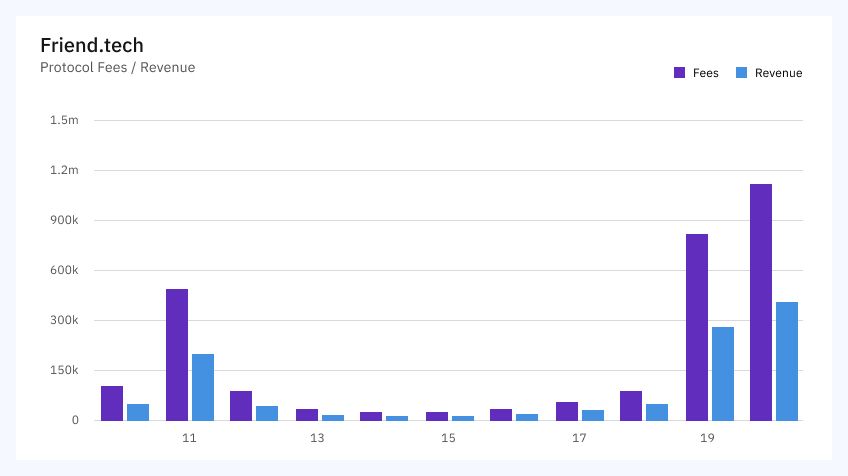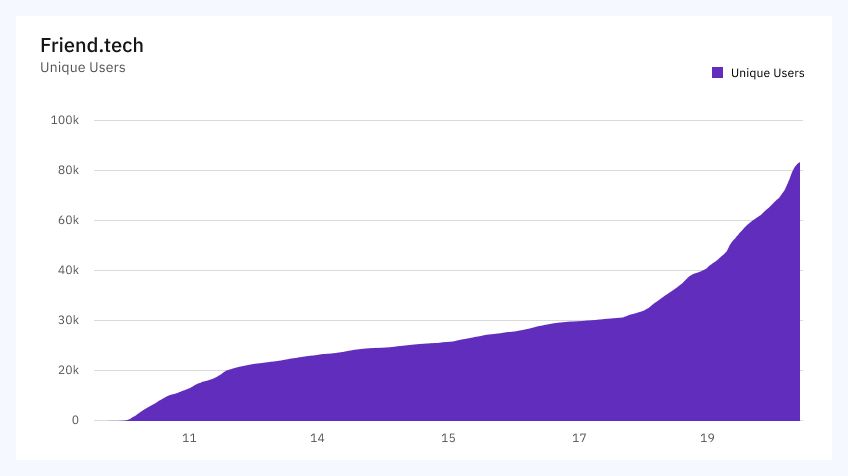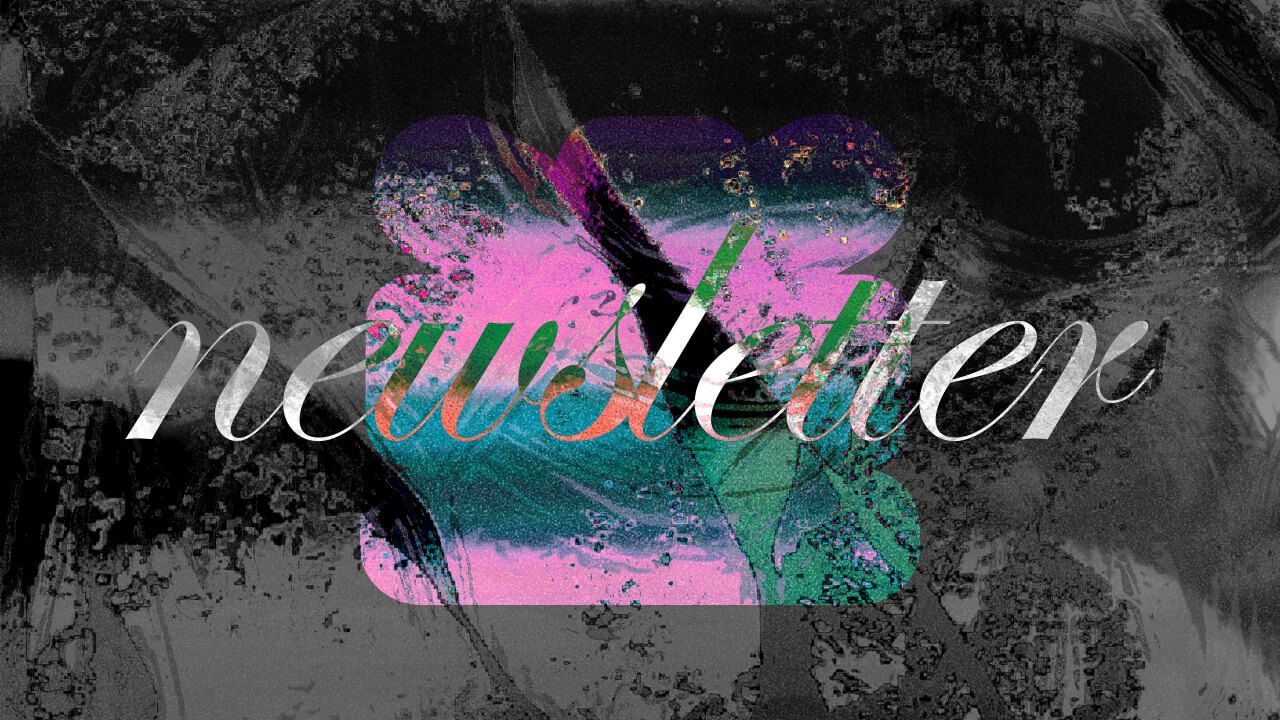Newsletter: Having fun onchain + F(R)EE MINTS
This week we cover: F(r)ee mints, Fun Onchain, Zora Mints, and Autonomous Worlds
By Forefront - Aug 20, 2023
Happy Monday!!!
Welcome to edition 154th edition of the Forefront Newsletter. If you're new here, we give you a weekly roundup of the best news and insights at the intersection of crypto, culture, and community.
This week we’re covering:
- Spotlight 007: go collect some f(r)ee mints on Spotlight
- Modular blockchain debates + discourse
- Crypto x AI opportunities in financial markets
- ...and much more! Let’s get into it…
📩 Want to sponsor the Forefront Newsletter?
The Forefront Newsletter rounds up the best news and insights at the
intersection of culture, community, and crypto. Over 10,000 founders,
creators, and investors get it in their inbox every Monday morning.
If you’re interested in sponsoring the newsletter, reach out by email to
jihad@forefront.news
to explore opportunities to collaborate!
Week’s Highlight
The mints aren't really f(r)ee... and that's how it should be.
This week, the Forefront community spent a lot of time discussing free mints. In our Hangout with LGHT, we discussed free mints as an opportunity to get your work into more hands onchain, with the belief that as the blockchain becomes more important for creative activity, so will your onchain distribution.
We subsequently published a thread on free mints, and how L2s have served as an unlock for free mints to truly go "viral" onchain and be fun to collect. Meanwhile, free mints on Zora ( and now Hypeshot and other platforms) include a share of the protocol fee going directly into the creator's pocket. This means that the mint isn't really free, but it's close enough to unlock significantly more activity while remaining valuable for creators.
Later that day, Zora's cofounder published Mint+, an internal memo made public explaining how "free mints + fee" on Zora should be called "Zora Mints." This term leans into the Zora brand, arguing that "No different than we hear people referring to content on YouTube as 'YouTube Video' these can be thought of as Zora Mints."
The Zora Mint has only been around for a few weeks (at least in its current state with fees going to creators), but onchain dynamics are already shifting significantly. Curators and developers -- like Spotlight -- are getting paid. Creators are making thousands of dollars off of Zora Mints. Other platforms are shifting toward a f(r)ee model.
More from Mint+: "There is an inherent cost to interacting with onchain media." While onchain UX will need to improve significantly to onboard the next billion users, one thing remains clear: for blockchains to gain adoption in the creative world, *paying to support creators *will need to become muscle memory.
Take Note: We cannot build a new internet without changing individual behavior as well as platform behavior. Zora Mints are a major step toward making that a desirable shift.
What's Poppin'
OpenSea makes royalties optional again by sunsetting Operator Filter.
Once again, OpenSea has changed its royalty policy, this time for the worse. OpenSea announced that they will be sunsetting their Operator Filter, their last remaining royalty enforcement tool. The platform said it was making the change to do away with the "ineffective, unilateral enforcement" of NFT royalties --- without removing them completely. Yuga Labs responded to the announcement by stating that they will be ending support for Seaport protocol in upgradeable contracts and any new collections. Billionaire Mark Cuban concurred, "Not collecting and paying royalties on NFT sales is a HUGE mistake by OpenSea," Cuban wrote on social media. "It diminished trust in the platform and hurts the industry. And I say this as an OpenSea investor." It's unlikely OpenSea rolls back the decision after making the change multiple times, but it's a disappointing one to say the least.
Gitcoin + Shell: A Collaboration and a Controversy.
Gitcoin announced a partnership with Shell... and people weren't happy. The collaboration will include a donation to the Gitcoin matching fund for the next four Climate Solutions rounds in the Gitcoin Grants Program, and a hackathon in Q4 of this year, focused on blockchain-related energy use cases. Kevin Owocki explained that while he disagreed with the partnership personally, it was emblematic of the credible neutrality of the Gitcoin protocol. Gitcoin's Executive Director shared the battles he went through to get the terms of the partnership to the point that was made public, but accepted responsibility for the poor communications and lending legitimacy to a company with a horrible reputation. All in all, Gitcoin will continue chugging and doing great work, but they will need to explore ways to mend their reputation and ensure something like this doesn't happen again.
In the past few years, many of the largest consumer brands in the world entered the web3 space for the first time. This piece from Karen Shen of Collab+Currency aims to shed light on the opportunity set for traditional brands entering web3 --- first through the lens of brand history, then through a discussion of quantifying consumer crypto success, and finally, by describing the qualities of projects that have best capitalized on the consumer crypto opportunity. She argues that web3 and its ability to incentivize cultures, networked communities, co-creation, and ownership, is the next important vector for competition. It provides brands with a rich design space to find new ways to connect with their community, at a time when consumers are seeking deeper connections.
The Hidden Costs of Modular Systems + Debate
Kyle Samani wrote a piece called "The Hidden Costs of Modular Systems," and Nick White of Celestia responded with a thread of his own disagreeing with the majority of Kyle's main points. We'll let the debate speak for itself, but it's a great learning resource for folks unfamiliar with the modular vs. monolithic debate. 0xSydney of Eclipse also responded to Kyle, saying "The idea of modular blockchains brought to us by Celestia is just the first step towards a future state of verifiable blockchains that is easily accessible by an even wider audience. Rollup networks such as Eclipse are the destination." Really insightful and clear discourse.
How AI x Crypto Will Transform Financial Markets.
We live in a world of inefficient markets. In these markets, most assets sit idle, most risk goes unhedged, and most financial opportunities remain undiscovered. In large part, this is due to the fact that the overhead of time, effort, and resources to accurately price most assets, predict most risks, and unlock most financial opportunities is higher than the potential reward. AI will change that. This essay argues that the advent of AI and blockchain technologies will dismantle the obstacles in the way of discovering "long-tail assets" and open the floodgates to financial inclusion. There has been much written on the intersection of crypto x AI, but this essay in particular offers a pretty novel vision of the future.
Zynga web3 Play-to-Earn Game: "Sugartown"
Take-Two subsidiary Zynga is launching "Sugartown," a game players will access with Ethereum (ERC-721) tokens. The new game gives players a chance to earn "an in-game currency." An initial mint of 10,000 tokens is slated for later this year. Many play-to-earn games were panned as boring, feeling more like a job than a pastime (in some cases, people actually made them a job). But Zynga is known for churning out colorful, addictive games that people flock to for free. Its foray into web3 could be a power-up for the crypto-gaming industry. But "Sugartown" could also meet resistance if people stay soured on play-to-earn.
The Case for Autonomous Worlds
Won't say much about this essay other than that it is an absolute must-read. Developments in "autonomous worlds" are where most of the previous "metaverse" activity is happening, except real progress is being made in a way that takes full advantage of open technologies. "As our taken-for-granted intersubjective realities come under increasing threat, Autonomous Worlds can help them anchor into a more durable and stable interobjective digital reality. Autonomous Worlds can become the digital table we sit around, the container in which we can begin to fashion a new form of communal sense."
Mainstream headlines this week…
Small Exchanges. First, small cryptocurrency exchanges rated as having higher levels of risk for customers have been the main winners from Binance's hefty decline in market share in the five months since US regulators charged it with violating federal laws.
PayPal x Ledger. Next, PayPal has joined Ledger Live's 'Buy' section as a new payment method and 'Buy' provider.
Trump. Finally, former US President Donald Trump currently holds $2.8 million in ETH after debuting an NFT collection last year.
Market Trends
After today, the "Market Trends" section of the newsletter will only be available to readers who have referred at least one (1) other subscriber. Refer a friend to get access.
Friend.tech is blowing up... let's dive into the numbers.
+ Protocol fees and revenue generated by the app are both skyrocketing.

+ Friend.tech is -- by far -- the fastest growing social crypto app.

+ The app is 3rd in protocol revenue in the last 24 hours at $709,739 (fees: $1.42M). This is higher than Base itself, the L2 that friend.tech uses.
While opinions on friend.tech vary, it's clear that lots of people are using it. The incentives are in place for wild speculation, and people are acting accordingly. Whether the app can truly become the "social" disruption that web3 is looking for is a completely different story. So far, most folks are there to experiment and pump their bags.
Inbox Signal TL;DR
The third edition of Inbox Signal just went out to Forefront Members this weekend. Here's a taste of the stories:
-
MEMORY PALACES. A new way to secure digital identity in mixed reality.
-
PARTY. Party announces Operators.
-
ETHER FUTURES. SEC set to approve Ethereum futures.
-
ROYALTIES. OpenSea once again makes royalties optional.
-
TORNADO. Tornado Cash loses lawsuit.
Forefront Members get full access to Signal -- our daily curated feed on consumer and creator crypto -- every day. You can become a Forefront Member by minting a 2023 Annual Pass here.
For the Culture

The information in this newsletter is not intended to constitute legal, financial or investment advice and should not be construed or relied upon as such. Any opinions reflected are the opinion of the author(s) of the newsletter only and not necessarily of Forefront. Please DYOR.
